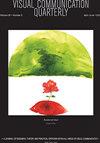Gateway Visuals: Strategies of Climate Photographers in the Digital Age
IF 0.5
Q4 COMMUNICATION
引用次数: 0
Abstract
AbstractVisual climate change communication has seen increased scholarly attention in recent years, with a strong focus on science communication. However, less is known about the producers of climate imagery. The current paper presents results from interviews with 20 photographers engaged in climate change on the challenges they see for climate photography today and the key strategies they use to achieve reach and impact in the digital media environment. Results indicate that practitioners gravitate toward variations of a ‘gateway strategy’, where motives and forms of visual presentation are chosen as gateways to bypass the potential resistance or indifference to climate change messages. The paper proposes a typology of such visual gateway strategies.DisclaimerAs a service to authors and researchers we are providing this version of an accepted manuscript (AM). Copyediting, typesetting, and review of the resulting proofs will be undertaken on this manuscript before final publication of the Version of Record (VoR). During production and pre-press, errors may be discovered which could affect the content, and all legal disclaimers that apply to the journal relate to these versions also. Additional informationNotes on contributorsJonas HarvardJonas Harvard is a Senior Lecturer at the Department of Media- and Communication Science, Mid Sweden University and Adjunct Professor in the History of Political Discourse and Communication at the University of Jyväskylä. His research concerns the roles of technology in journalism, media history in the Nordic countries, and the transformation of local news media business in Sweden. E-mail: jonas.harvard@miun.seMats HyvönenMats Hyvönen is a Media and Communications Scholar at Uppsala University and Research Coordinator for the Engaging Vulnerability Research Program. Specializing in media history, he is interested in the vulnerability of the public sphere and how media both feed and resist that vulnerability. Mats is currently conducting research on contemporary and historical links between journalism and academic scholarship.门户视觉:数字时代气候摄影师的策略
摘要近年来,气候变化视觉传播越来越受到学术界的关注,其中科学传播尤为突出。然而,人们对气候图像的制作者知之甚少。本文介绍了对20位从事气候变化工作的摄影师的采访结果,内容涉及他们认为当今气候摄影面临的挑战,以及他们在数字媒体环境中实现覆盖和影响的关键策略。结果表明,从业者倾向于“门户战略”的变化,其中选择视觉呈现的动机和形式作为门户,以绕过对气候变化信息的潜在抵制或漠不关心。本文提出了这种视觉门户策略的类型学。免责声明作为对作者和研究人员的服务,我们提供了这个版本的已接受的手稿(AM)。在最终出版版本记录(VoR)之前,将对该手稿进行编辑、排版和审查。在制作和印前,可能会发现可能影响内容的错误,所有适用于期刊的法律免责声明也与这些版本有关。作者简介乔纳斯·哈佛(jonas Harvard)是瑞典中部大学媒体与传播科学系的高级讲师,也是Jyväskylä大学政治话语与传播史的副教授。他的研究领域包括科技在新闻业中的作用、北欧国家的媒体史以及瑞典当地新闻媒体业务的转型。电子邮件:jonas.harvard@miun.seMats HyvönenMats Hyvönen是乌普萨拉大学的媒体和通信学者,也是参与脆弱性研究计划的研究协调员。他专攻媒体史,对公共领域的脆弱性以及媒体如何助长和抵制这种脆弱性感兴趣。马茨目前正在研究新闻与学术奖学金之间的当代和历史联系。
本文章由计算机程序翻译,如有差异,请以英文原文为准。
求助全文
约1分钟内获得全文
求助全文

 求助内容:
求助内容: 应助结果提醒方式:
应助结果提醒方式:


